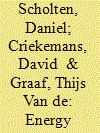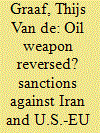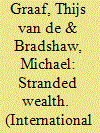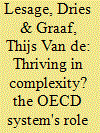|
|
|
Sort Order |
|
|
|
Items / Page
|
|
|
|
|
|
|
| Srl | Item |
| 1 |
ID:
170852


|
|
|
| 2 |
ID:
099207


|
|
|
|
|
| Publication |
2010.
|
| Summary/Abstract |
In recent years, the G8+5 system has proven to be a major focal point of international cooperation in the field of energy efficiency. The G8 has set up multiple dialogues and collaborative frameworks with five emerging economies (China, India, Brazil, Mexico and South Africa) on energy and energy efficiency. The most prominent initiative so far is the creation of the International Partnership for Energy Efficiency Cooperation (IPEEC) in 2009. This article critically evaluates these joint efforts between the G8 and the 'Plus Five' on energy efficiency. More specifically, the purpose of this article is (1) to frame and explain the emergence of this kind of great-power cooperation; (2) to map G8+5 collaboration on energy efficiency; and (3) to provide a critical assessment of the relevance, impact and results of G8+5 initiated energy efficiency initiatives. The main conclusion is that the G8+5 system has performed better on the external dimension (steering global governance) than on the internal dimension (coordination of domestic policies) of global energy efficiency governance.
|
|
|
|
|
|
|
|
|
|
|
|
|
|
|
|
| 3 |
ID:
115123


|
|
|
|
|
| Publication |
2012.
|
| Summary/Abstract |
Founded in response to the 1973 oil shock, the International Energy Agency (IEA) is arguably still the most important multilateral organization for energy-importing countries. Yet, the global geopolitical landscape has changed considerably since the IEA's creation. The rise of new energy consumers, new energy-related challenges and new international energy forums prompt a rethink of the agency's current role and institutional design. This article seeks to contribute to the recent debate on the future role of the IEA by examining specific drivers, avenues and constraints for institutional reform. The method used is SWOT analysis, which allows to summarize the key factors emanating from an assessment of an organization's internal characteristics (strengths and weaknesses) and its external environment (opportunities and threats). Building on this SWOT analysis, the article formulates a strategy for the IEA to remain the focal point in global energy governance. Key elements of this strategy include: stronger engagement with new consumers, rapprochement with OPEC, becoming a leading voice in the energy transition, and changing the agency's internal governance practices.
|
|
|
|
|
|
|
|
|
|
|
|
|
|
|
|
| 4 |
ID:
126061


|
|
|
| 5 |
ID:
163262


|
|
|
|
|
| Summary/Abstract |
This article argues that the oil industry is unlikely to return to the pre-2014 status quo as two profound shifts in technology and markets are dramatically changing the longer-term outlook for the oil industry. In the short term, traditional producers will feel persistent pressure from the shale revolution, a disruptive technology that has altered the cost curve and elasticity of oil supply. In the medium term, the industry must confront a structural slowdown and eventual peak in demand owing to innovation and evolving consumer preferences, related in part to concerns over climate change. Together, these shifts reflect a new energy order in which oil is no longer an exhaustible resource, new trading patterns emerge and oil prices exhibit greater short-term volatility amid a long-term declining trend. These new rules of the game force us to reconsider some of the theories and concepts of the international political economy of oil. We flag three key political effects from these market shifts: first, key oil-producing states face economic and political turmoil; second, OPEC cannot influence the price of oil in the long term by cutting output; and third, power is redistributed in the international system.
|
|
|
|
|
|
|
|
|
|
|
|
|
|
|
|
| 6 |
ID:
117944


|
|
|
|
|
| Publication |
2013.
|
| Summary/Abstract |
The purpose of this article is to reveal how two organizations from the OECD system-the Organisation for Economic Co-operation and Development and the International Energy Agency-are maneuvering strategically to retain their focal places in the regime complexes that developed around taxation and energy, respectively. It argues that their bid for leadership and centralization is built on the comparative advantages they enjoy as institutions; namely, their historically accumulated expertise and distinct working methods, their close ties with the Group of 8, and their rapidly developing relationships with emerging powers. Notwithstanding these institutional assets, a revision of the OECD's membership could further cement and legitimize the central role of the OECD system in these regime complexes.
|
|
|
|
|
|
|
|
|
|
|
|
|
|
|
|
|
|
|
|
|